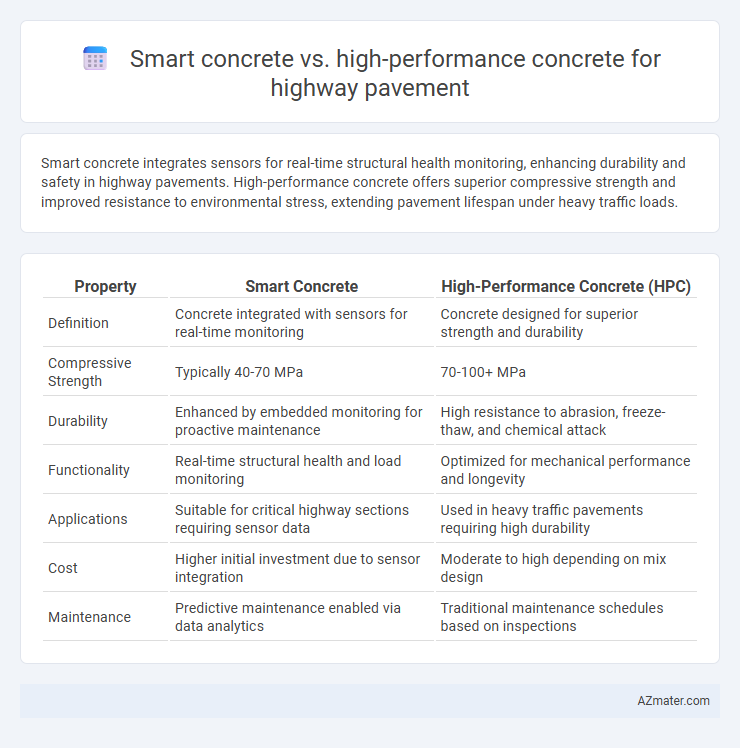Smart concrete integrates sensors for real-time structural health monitoring, enhancing durability and safety in highway pavements. High-performance concrete offers superior compressive strength and improved resistance to environmental stress, extending pavement lifespan under heavy traffic loads.
Table of Comparison
| Property | Smart Concrete | High-Performance Concrete (HPC) |
|---|---|---|
| Definition | Concrete integrated with sensors for real-time monitoring | Concrete designed for superior strength and durability |
| Compressive Strength | Typically 40-70 MPa | 70-100+ MPa |
| Durability | Enhanced by embedded monitoring for proactive maintenance | High resistance to abrasion, freeze-thaw, and chemical attack |
| Functionality | Real-time structural health and load monitoring | Optimized for mechanical performance and longevity |
| Applications | Suitable for critical highway sections requiring sensor data | Used in heavy traffic pavements requiring high durability |
| Cost | Higher initial investment due to sensor integration | Moderate to high depending on mix design |
| Maintenance | Predictive maintenance enabled via data analytics | Traditional maintenance schedules based on inspections |
Introduction to Smart and High-Performance Concrete
Smart concrete integrates sensors and self-healing agents to monitor and address structural health in highway pavement, enhancing durability and safety. High-performance concrete (HPC) is engineered with optimized mix designs and advanced materials to achieve superior strength, durability, and resistance to environmental stress. Both technologies aim to extend pavement life, reduce maintenance costs, and improve overall infrastructure resilience.
Key Properties of Smart Concrete
Smart concrete incorporates self-sensing capabilities through embedded sensors or conductive materials, enabling real-time structural health monitoring for highway pavements. Key properties include enhanced durability, crack detection, and stress-resistance due to nanomaterials like carbon nanotubes or graphene. High-performance concrete emphasizes strength and longevity but lacks the autonomous monitoring and adaptive features inherent in smart concrete.
High-Performance Concrete: Core Characteristics
High-performance concrete (HPC) for highway pavement exhibits enhanced durability, high compressive strength often exceeding 60 MPa, and superior resistance to chemical attacks, freeze-thaw cycles, and abrasion. Its optimized mix design incorporates supplementary cementitious materials like fly ash or silica fume, reducing permeability and increasing lifespan under heavy traffic loads. HPC's improved mechanical properties enable reduced maintenance frequency and greater long-term pavement sustainability compared to traditional concrete options.
Material Composition and Innovations
Smart concrete incorporates advanced sensors and self-healing materials, embedding nanomaterials like carbon nanotubes and fiber optics within its matrix to monitor structural health and environmental changes in real-time. High-performance concrete (HPC) features optimized cementitious materials, high-range water reducers, silica fume, and fly ash to achieve superior strength, durability, and resistance to freeze-thaw cycles in highway pavement applications. Innovations in smart concrete focus on intelligent monitoring and adaptive responses, while HPC advances emphasize mix design optimization and enhanced mechanical properties for long-lasting pavement performance.
Performance in Highway Pavement Applications
Smart concrete integrates sensors and self-healing properties, enhancing durability and real-time monitoring of highway pavement health, which reduces maintenance costs and extends service life. High-performance concrete (HPC) offers superior strength, improved resistance to freeze-thaw cycles, and enhanced abrasion resistance, making it ideal for heavy traffic and harsh weather conditions. Performance in highway applications depends on the balance between structural longevity provided by HPC and the predictive maintenance enabled by smart concrete technologies.
Durability and Longevity Comparison
Smart concrete incorporates self-healing properties through embedded microcapsules or fibers that release healing agents when cracks form, significantly enhancing durability and preventing early deterioration in highway pavement. High-performance concrete (HPC) achieves superior strength and resistance to environmental stressors by optimizing mix design with supplementary cementitious materials and precise aggregate grading, resulting in extended service life under heavy traffic loads. While HPC offers robust mechanical properties and reduced permeability, smart concrete's autonomous repair capability provides a transformative approach to maximizing pavement longevity and reducing maintenance costs.
Cost Implications and Life Cycle Analysis
Smart concrete incorporates sensors that enable real-time monitoring of highway pavement conditions, potentially reducing maintenance costs by preventing major failures. High-performance concrete (HPC) offers enhanced durability and strength, leading to longer service life and lower lifecycle costs despite higher initial expenses. Life cycle analysis reveals that while smart concrete entails upfront investment in technology integration, its ability to optimize maintenance timing can offset costs over time compared to traditional HPC solutions.
Maintenance and Monitoring Capabilities
Smart concrete integrates embedded sensors that enable real-time monitoring of structural health and traffic loads, significantly enhancing maintenance scheduling and reducing unexpected repairs for highway pavements. High-performance concrete, while offering superior strength and durability, primarily relies on periodic manual inspections and testing for maintenance decision-making. The advanced data analytics facilitated by smart concrete sensors optimize life-cycle management, minimizing downtime and extending pavement lifespan compared to traditional high-performance concrete approaches.
Environmental Impact and Sustainability
Smart concrete for highway pavement integrates sensors and self-healing properties that reduce maintenance needs and extend service life, thereby lowering environmental footprints compared to traditional mixes. High-performance concrete (HPC) offers enhanced durability and strength, resulting in longer-lasting pavements that reduce resource consumption and carbon emissions over time. Both materials contribute to sustainability by optimizing lifecycle performance, but smart concrete's real-time monitoring enables proactive maintenance that further minimizes environmental impact.
Future Trends in Highway Pavement Technologies
Smart concrete integrates sensors and self-healing properties to provide real-time monitoring and enhanced durability, enabling predictive maintenance in highway pavement. High-performance concrete (HPC) offers superior strength, enhanced durability, and reduced permeability, making it ideal for long-lasting pavement solutions under heavy traffic loads. Future trends emphasize incorporating smart concrete technologies into HPC to optimize structural health monitoring and extend pavement lifespan with sustainable, cost-effective materials.

Infographic: Smart concrete vs High-performance concrete for Highway pavement
 azmater.com
azmater.com